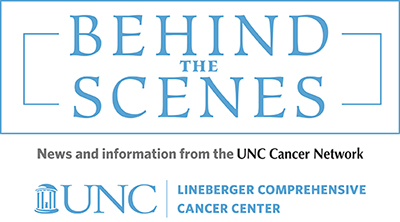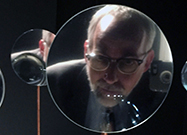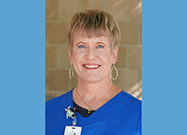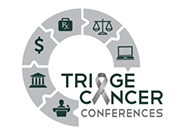Behind the Scenes — September 2019

From the Telehealth Director
Dear UNC Cancer Network Community Members,
September finds the UNC Cancer Network Telehealth team busily planning for 2020. Thanks to all of you who shared your feedback in surveys and evaluations. I feel confident that we will be able to engage our very distinguished nurses, physicians, researchers, and others to bring you the best professional oncology lecture lineup ever in 2020.
I was very proud to see that our team received a mention via a recent video on the Community Service Leave program at UNC. You may find this at: https://www.youtube.com/watch?v=Ne4BJnz8aaM. We are fortunate to have a program here at UNC that encourages volunteering, and we look forward to identifying new ways that we can give back to our community in the months ahead. Special thanks to Mary, Vene, and Jon for all of their volunteer contributions.
As always, please continue to help us spread the word about our free online oncology education lectures.
All the best,
Tim.
![]()
A Closer Look at Radiation Therapy and the People who Make it Happen
Dana Lachapelle, RTT, is the Radiation Therapy Supervisor at UNC Hospitals Department of Radiation Oncology. I recently had the pleasure of discussing Radiation Therapy with her and the critical role that she and her colleagues play in cancer care.
UNCCN: What is Radiation Therapy (RT)?
Lachapelle: Radiation Therapy is therapy using ionizing radiation to treat cancer.
UNCCN: How does RT work?
Lachapelle: Radiation works by destroying the cancel cells. The intent is to be very precise and focus on killing the “bad” cells and do as little damage as possible to the healthy cells.
UNCCN: What is the difference between a radiation therapist and a radiation technologist?
Lachapelle: A radiologic technologist images the patient to help diagnose. Once a cancer diagnosis is made, the radiation therapists will treat the patient according to the radiation oncologist approved treatment plan.
UNCCN: What is a typical day like?
Lachapelle: The therapist will typically arrive to work between 6:00 a.m.- 6:30 a.m. Daily warmup/quality assurance checks have to be performed every day on the machines before we can treat patients. We have five machines that our patients are treated on. A patient is dedicated to one machine. Treatments start between 7:00 a.m. and 7:30 a.m. all depending on our current load. We have patients scheduled approximately every 15 minutes. We do not have 2nd or 3rd shifts so we will keep the machines running until the last patient is treated. We usually finish up around 5:00 p.m. although there have been times when we have to go later. Therapist are responsible for lining the patient up and delivering the radiation which is all in accordance with the written directive from the radiation oncologist. Therapist help monitor any side effects or complications from the radiation and direct those patients to our nurses who along with the radiation oncologist will see the patient.
UNCCN: What information is used to make treatment recommendations for patients?
Lachapelle: Radiation oncologist are the physicians who specialize in radiation therapy. When patients see the radiation oncologists it is decided then whether or not to treat with radiation. That all depends on the disease site and the stage of the disease. Patients are treated with the intent to cure their disease but there are times when radiation is used to palliate pain.
UNCCN: How do you help patients deal with the side effects?
Lachapelle: Side effects from radiation are based on where the treatments are given. It is not systemic. Patients are seen weekly by their physician to monitor any side effects and treat them if necessary, to avoid any breaks during their course of treatments. Many patients receive chemotherapy while they are undergoing radiation. Those treatments are coordinated up front so the patient is aware of their schedule. Radiation treatments are given Monday through Friday anywhere from 1 week up to seven weeks depending on their disease site and the total dose that needs to be delivered.
UNCCN: Is there anything else you would like for our readers to know about being an RT or about your department?
Lachapelle: Our department has many people that contribute to the care of our patients. There are lots of “behind the scenes” groups that work very hard to ensure our patients are treated accurately. We would not be able to do this without everyone’s important input.
![]()

Upcoming Live Events
September 11, 2019
Claire Gillett, RN, MSN, OCN
Professional Development and Continuing Education for Oncology Nurses
https://unclineberger.org/unclcn/professional-education/calendars/telehealth-lectures/”
This lecture includes a review of professional development guidelines for Oncology Nurses, including education requirements for the State of North Carolina Board of Nursing. Claire Gillett will review favorite places to receive continuing education credits, as well as the UNC Lineberger Comprehensive Cancer Center’s/UNC Cancer Network’s RN education program and our 2019 schedule and list of topics.
September 25, 2019
Brian Colwell Jensen, MD
Cardiotoxicity and New Therapies
https://unclineberger.org/unclcn/professional-education/calendars/telehealth-lectures/”
When there is damage to the heart muscle, we call this cardiotoxicity. Brian Jensen, MD, will talk about underlying mechanisms for the cardiotoxicity of kinase inhibitors used to treat cancer.
![]()
Triage Cancer Conference
Triage Cancer offers a series of FREE educational conferences for individuals diagnosed with cancer, caregivers, advocates, and oncology healthcare professionals. Learn valuable information about navigating practical cancer survivorship issues, from beyond diagnosis, into post-treatment survivorship.
Check out the website for more information about events, speakers, dates, locations, resources, conference topics, travel assistance, and presenting sponsors.
![]()
The Patient Education Corner
Expert information for the patients you care for in language that everyone can understand
by Jennifer Potter, MPH, CHES
Does Prostate Cancer Screening Save Lives?
In this talk you will learn about prostate cancer, a common cancer in men. Learn who is most at risk for developing prostate cancer and the best ways to find it early. Our speaker will be Mary Dunn, MSN, NP-C, OCN, RN.
Our next Cancer Conversations webinar is on 9/27/19 at 12:00 noon. Viewers can register by clicking here.
![]()

Recent Additions to the Learning Portal
Katharine Harrell, NP-C
Helping Patients with Breast Cancer
https://learn.unccn.org/online-course-catalog/rn-and-allied-health-courses/”
This lecture touches on various topics important in helping breast cancer patients. We’ll discuss early detection, risk factors, diagnoses, treatment, and survivorship as well as breast cancer treatment modalities, including hormone inhibitors. Some patients might want information about plastic surgery (breast reconstruction), and tips on using cryotherapy for prevention of peripheral neuropathy.
Jayne Camporeale, MS, RN, OCN, APRN
Mary Fleming Knowles, MSN, ANP-C
Radiation Oncology 101
https://learn.unccn.org/online-course-catalog/rn-and-allied-health-courses/”
Radiation therapy can be used alone or in combination with chemotherapy in cancer treatment plans. This discussion will review the different forms of radiation therapy (including Proton Therapy, etc.), how it works, and how it can be used in combination with chemotherapy. Since radiation therapy has its own set of side effects, the speaker will address the most common symptoms (such issues as appetite loss and radiation mucositis) and how to help patients deal with them.
Lisa Carey, MD
Decision-Making in Metastatic Breast Cancer
https://learn.unccn.org/online-course-catalog/medical-and-surgical-oncology-courses/”
Of women diagnosed with early-stage breast cancer, approximately 20% will develop metastatic disease. Metastatic disease is incurable, but increasingly controllable with modern therapies
Raj Pruthi, MD
Improving Outcomes in Radical Cystectomy
https://learn.unccn.org/online-course-catalog/medical-and-surgical-oncology-courses/”
The lecture will evaluate the recent improvements in patients undergoing radical cystectomy for bladder cancer (including peri-operative chemotherapy and robotic surgery) and will describe some of the obstacles to providing optimal care that still exist.
![]()
Learn more about the continuing education and other outreach efforts of the UNC Cancer Network. Many of the outreach programs that are part of the UNC Cancer Network are funded through the University Cancer Research Fund. Find out what UNCCN is doing by following us on Twitter at @unc_cn, join us on Facebook at www.facebook.com/unccn, unccn.org, or email us at unccn@unc.edu
We have signed you up for our newsletter with the hope that you will find value in its content. If this was forwarded to you by a colleague or friend, and you want to be added to our distribution list, please send us an email at unccnoperations@unc.edu.
Editor: Mary King, meking@email.unc.edu
Contributors: Dr. Thomas C. Shea; Tim Poe, Telehealth Director: Jon Powell, PhD, Continuing Education Specialist: and Veneranda Obure, AV Support Engineer.
Copyright © 2019 UNC School of Medicine Office of Information Systems, All rights reserved.



